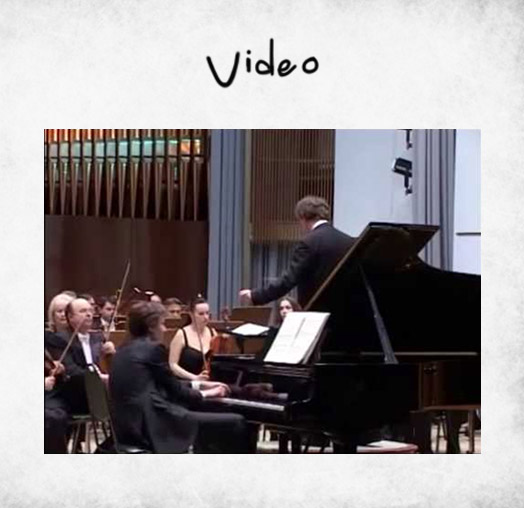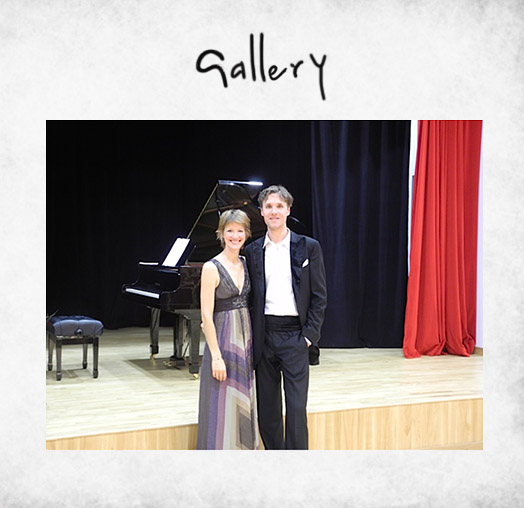
I have heard Gabrielius Alekna play and consider him a highly gifted pianist and musician.
Daniel Barenboim, August 2000
A fine showing, too, from Gabrielius Alekna in what can seem a teasingly intangible piano part.
Gramophone Magazine, April 2021 (on Žibuoklė Martinaitytė’s ‘Chiaroscuro Trilogy’ in ‘Ondine’ release ‘Saudade’)
Pianist Gabrielius Alekna and the Lithuanian Chamber Orchestra perform with subtlety yet robustness…
BBC Music Magazine, March 2021 (on Žibuoklė Martinaitytė’s ‘Chiaroscuro Trilogy’ in ‘Ondine’ release ‘Saudade’)
…Performances and recording quality are first-rate. Pianist Gabrielius Alekna is clearly at home in the idiom… He brings both pinpoint accuracy…and sensitivity to piano parts that are undoubtedly trickier to negotiate than they sound.
Fanfare, November 2015 (on the ‘NAXOS’ release ‘Vytautas Bacevičius: Orchestral Works, Vol. 1’)
[Gabrielius Alekna] brought sterling virtuosity and comprehension to Beethoven’s “Emperor” Concerto, Op. 73. His assured but refined pianism had clarity, bravura, authority, and easily held its own amidst Beethoven’s busy orchestration. He obliged his enthusiastic admirers with a lovely, flexible singing account of ”Bruyeres” from Debussy’s second book of Preludes.
New York Concert Review, April 11, 2011
…Gabrielius Alekna gives masterly performances of what must be seriously challenging scores. His style is modern and efficient, with crystal clear articulation and only the minimum of rubato indulgence. …For the Seventh [Mot] Alekna is joined by the legendary pianist Ursula Oppens on the second piano part. His colleagues do him proud, but Alekna has the lion’s share of the work here. …[Alekna] should probably be considered a key figure in the ongoing Bacevičius revival. …An impressive release all around, and a perfect demonstration of the good work Toccata Classics is doing in giving voice to under-appreciated composers.
Fanfare, November/December 2012 (on the ‘Toccata Classics’ release of Vytautas Bacevičius’ Complete Mots)
A previous disc of music by Vytautas Bacevičius (1905-70) issued by Toccata Classics left a predominantly equivocal impression, but this follow-up proves more consistently absorbing. It brings together the seven Mots (‘Words’), five of which here receive their first recording, written over a 33-year period and giving an overview of the creative development of a composer whose initial success in his native Lithuania was cut short by war then never re-established after he had settled in the USA. …Impractical as a concert proposition, the cycle is ideally accommodated on disc – not least when Gabrielius Alekna is so alive to the music’s forging of an idiom which, if less innovative or personal than its composer might have intended, is rarely less than engaging on its own terms.
TheClassicalReview.com, February 22, 2012
Alekna is fantastic.
Paolo Fazioli, founder and owner of Fazioli pianoforti, February 2004
Ray Iwazumi and Gabrielius Alekna brought great care and presence to Ursula Mamlok’s Sonata for Violin and Piano.
The New York Times, February 5, 2002
[The last Sonata by Ludwig van Beethoven] crowned Gabrielius’s recital, enchanting with the power of aestheticised feelings and intellectual ideas. Lyric resonance of supernatural beauty followed reigned-in drama of musical depths; sacralized pronouncements of Beethoven’s text irrevocably sank into one’s memory.
Lietuvos Rytas (The Lithuanian morning), Lithuania, December 6, 2010
Lithuanian Gabrielius Alekna did marvels with Schumann‘s Sonata No. 2.
Pretoria News, South Africa, January 29, 2004
The Piano Quintet by Johannes Brahms was masterfully performed by pianist Gabrielius Alekna, in collaboration with the Vilnius String Quartet.
Lietuvos Rytas (The Lithuanian morning), Lithuania, January 31, 2006
Especially memorable is harmoniousness of Alekna’s playing per se, i.e. a perfect agreement of all aspects and details of performance, of the vertical and the horizontal. This harmoniousness is so … confident and so unified that one realizes how impressive is this calmness, this refined, natural freedom, this unforced yet never monotonous unity of conception.
Muzikos barai (Musical aspects), Lithuania, May-June 2006
…Alekna has a striking presence and a personality that reaches beyond the footlights. [Rachmaninov’s Prelude in] G-flat Major, Op. 23, No. 10—was a gem.
The Island Packet, Hilton Head, South Carolina, March 7, 1999
The three etudes by Alexander Scriabin [Op. 65] were an extraordinary success for Gabrielius Alekna, worthy of a place in the annals of our performers’ art.
Literatūra ir Menas (Literature and Arts), Lithuania, August 22, 2003
[The cellist] Edvardas Armonas and Gabrielius Alekna revealed their main qualities: artistic maturity, musicality, high professionalism, mutual respect – the very qualities that are used to describe great masters. …Their recital left a strong impression. It was one of those concerts that renew one’s love of the classics.
7 Meno dienos (7 days in the arts), Lithuania, December 14, 2001
Gabrielius Alekna is a true artist whose perfect technique and a rich culture are fully applied during his interpretation of musical works. The audience was immediately taken by his authority and his grand interpretation style with no reservations. In a world with so many false values, it is important to appreciate such an authentic and convincing artist.
Dominique Merlet, Concert Pianist, Honorary President of EPTA (European Piano Teachers Association), President of Nadia and Lili Boulanger International Foundation, October 2006


